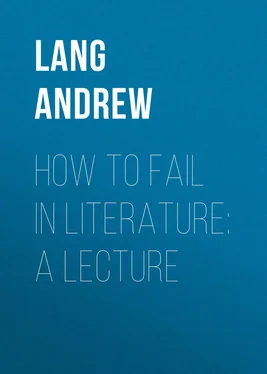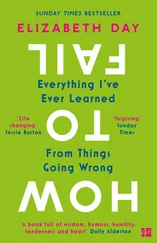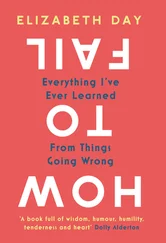Andrew Lang - How to Fail in Literature - A Lecture
Здесь есть возможность читать онлайн «Andrew Lang - How to Fail in Literature - A Lecture» — ознакомительный отрывок электронной книги совершенно бесплатно, а после прочтения отрывка купить полную версию. В некоторых случаях можно слушать аудио, скачать через торрент в формате fb2 и присутствует краткое содержание. Жанр: foreign_antique, foreign_prose, на английском языке. Описание произведения, (предисловие) а так же отзывы посетителей доступны на портале библиотеки ЛибКат.
- Название:How to Fail in Literature: A Lecture
- Автор:
- Жанр:
- Год:неизвестен
- ISBN:нет данных
- Рейтинг книги:3 / 5. Голосов: 1
-
Избранное:Добавить в избранное
- Отзывы:
-
Ваша оценка:
- 60
- 1
- 2
- 3
- 4
- 5
How to Fail in Literature: A Lecture: краткое содержание, описание и аннотация
Предлагаем к чтению аннотацию, описание, краткое содержание или предисловие (зависит от того, что написал сам автор книги «How to Fail in Literature: A Lecture»). Если вы не нашли необходимую информацию о книге — напишите в комментариях, мы постараемся отыскать её.
How to Fail in Literature: A Lecture — читать онлайн ознакомительный отрывок
Ниже представлен текст книги, разбитый по страницам. Система сохранения места последней прочитанной страницы, позволяет с удобством читать онлайн бесплатно книгу «How to Fail in Literature: A Lecture», без необходимости каждый раз заново искать на чём Вы остановились. Поставьте закладку, и сможете в любой момент перейти на страницу, на которой закончили чтение.
Интервал:
Закладка:
Andrew Lang
How to Fail in Literature: A Lecture
PREFACE
This Lecture was delivered at the South Kensington Museum, in aid of the College for Working Men and Women. As the Publishers, perhaps erroneously, believe that some of the few authors who were not present may be glad to study the advice here proffered, the Lecture is now printed. It has been practically re-written, and, like the kiss which the Lady returned to Rodolphe , is revu, corrigé, et considerablement augmenté.
A. L.
HOW TO FAIL IN LITERATURE
What should be a man’s or a woman’s reason for taking literature as a vocation, what sort of success ought they to desire, what sort of ambition should possess them? These are natural questions, now that so many readers exist in the world, all asking for something new, now that so many writers are making their pens “in running to devour the way” over so many acres of foolscap. The legitimate reasons for enlisting (too often without receiving the shilling) in this army of writers are not far to seek. A man may be convinced that he has useful, or beautiful, or entertaining ideas within him, he may hold that he can express them in fresh and charming language. He may, in short, have a “vocation,” or feel conscious of a vocation, which is not exactly the same thing. There are “many thyrsus bearers, few mystics,” many are called, few chosen. Still, to be sensible of a vocation is something, nay, is much, for most of us drift without any particular aim or predominant purpose. Nobody can justly censure people whose chief interest is in letters, whose chief pleasure is in study or composition, who rejoice in a fine sentence as others do in a well modelled limb, or a delicately touched landscape, nobody can censure them for trying their fortunes in literature. Most of them will fail, for, as the bookseller’s young man told an author once, they have the poetic temperament, without the poetic power. Still among these whom Pendennis has tempted, in boyhood, to run away from school to literature as Marryat has tempted others to run away to sea, there must be some who will succeed. But an early and intense ambition is not everything, any more than a capacity for taking pains is everything in literature or in any art.
Some have the gift, the natural incommunicable power, without the ambition, others have the ambition but no other gift from any Muse. This class is the more numerous, but the smallest class of all has both the power and the will to excel in letters. The desire to write, the love of letters may shew itself in childhood, in boyhood, or youth, and mean nothing at all, a mere harvest of barren blossom without fragrance or fruit. Or, again, the concern about letters may come suddenly, when a youth that cared for none of those things is waning, it may come when a man suddenly finds that he has something which he really must tell. Then he probably fumbles about for a style, and his first fresh impulses are more or less marred by his inexperience of an art which beguiles and fascinates others even in their school-days.
It is impossible to prophesy the success of a man of letters from his early promise, his early tastes; as impossible as it is to predict, from her childish grace, the beauty of a woman.
But the following remarks on How to fail in Literature are certainly meant to discourage nobody who loves books, and has an impulse to tell a story, or to try a song or a sermon. Discouragements enough exist in the pursuit of this, as of all arts, crafts, and professions, without my adding to them. Famine and Fear crouch by the portals of literature as they crouch at the gates of the Virgilian Hades. There is no more frequent cause of failure than doubt and dread; a beginner can scarcely put his heart and strength into a work when he knows how long are the odds against his victory, how difficult it is for a new man to win a hearing, even though all editors and publishers are ever pining for a new man. The young fellow, unknown and unwelcomed, who can sit down and give all his best of knowledge, observation, humour, care, and fancy to a considerable work has got courage in no common portion; he deserves to triumph, and certainly should not be disheartened by our old experience. But there be few beginners of this mark, most begin so feebly because they begin so fearfully. They are already too discouraged, and can scarce do themselves justice. It is easier to write more or less well and agreeably when you are certain of being published and paid, at least, than to write well when a dozen rejected manuscripts are cowering (as Theocritus says) in your chest, bowing their pale faces over their chilly knees, outcast, hungry, repulsed from many a door. To write excellently, brightly, powerfully, with these poor unwelcomed wanderers, returned MSS., in your possession, is difficult indeed. It might be wiser to do as M. Guy de Maupassant is rumoured to have done, to write for seven years, and shew your essays to none but a mentor as friendly severe as M. Flaubert. But all men cannot have such mentors, nor can all afford so long an unremunerative apprenticeship. For some the better plan is not to linger on the bank, and take tea and good advice, as Keats said, but to plunge at once in mid-stream, and learn swimming of necessity.
One thing, perhaps, most people who succeed in letters so far as to keep themselves alive and clothed by their pens will admit, namely, that their early rejected MSS. deserved to be rejected . A few days ago there came to the writer an old forgotten beginner’s attempt by himself. Whence it came, who sent it, he knows not; he had forgotten its very existence. He read it with curiosity; it was written in a very much better hand than his present scrawl, and was perfectly legible. But readable it was not. There was a great deal of work in it, on an out of the way topic, and the ideas were, perhaps, not quite without novelty at the time of its composition. But it was cramped and thin, and hesitating between several manners; above all it was uncommonly dull. If it ever was sent to an editor, as I presume it must have been, that editor was trebly justified in declining it. On the other hand, to be egotistic, I have known editors reject the attempts of those old days, and afterwards express lively delight in them when they struggled into print, somehow, somewhere. These worthy men did not even know that they had despised and refused what they came afterwards rather to enjoy.
Editors and publishers, these keepers of the gates of success, are not infallible, but their opinion of a beginner’s work is far more correct than his own can ever be. They should not depress him quite, but if they are long unanimous in holding him cheap, he is warned, and had better withdraw from the struggle. He is either incompetent, or he has the makings of a Browning. He is a genius born too soon. He may readily calculate the chances in favour of either alternative.
So much by way of not damping all neophytes equally: so much we may say about success before talking of the easy ways that lead to failure. And by success here is meant no glorious triumph; the laurels are not in our thoughts, nor the enormous opulence (about a fourth of a fortunate barrister’s gains) which falls in the lap of a Dickens or a Trollope. Faint and fleeting praise, a crown with as many prickles as roses, a modest hardly-gained competence, a good deal of envy, a great deal of gossip – these are the rewards of genius which constitute a modern literary success. Not to reach the moderate competence in literature is, for a professional man of letters of all work, something like failure. But in poetry to-day a man may succeed, as far as his art goes, and yet may be unread, and may publish at his own expense, or not publish at all. He pleases himself, and a very tiny audience: I do not call that failure. I regard failure as the goal of ignorance, incompetence, lack of common sense, conceited dulness, and certain practical blunders now to be explained and defined.
Читать дальшеИнтервал:
Закладка:
Похожие книги на «How to Fail in Literature: A Lecture»
Представляем Вашему вниманию похожие книги на «How to Fail in Literature: A Lecture» списком для выбора. Мы отобрали схожую по названию и смыслу литературу в надежде предоставить читателям больше вариантов отыскать новые, интересные, ещё непрочитанные произведения.
Обсуждение, отзывы о книге «How to Fail in Literature: A Lecture» и просто собственные мнения читателей. Оставьте ваши комментарии, напишите, что Вы думаете о произведении, его смысле или главных героях. Укажите что конкретно понравилось, а что нет, и почему Вы так считаете.












